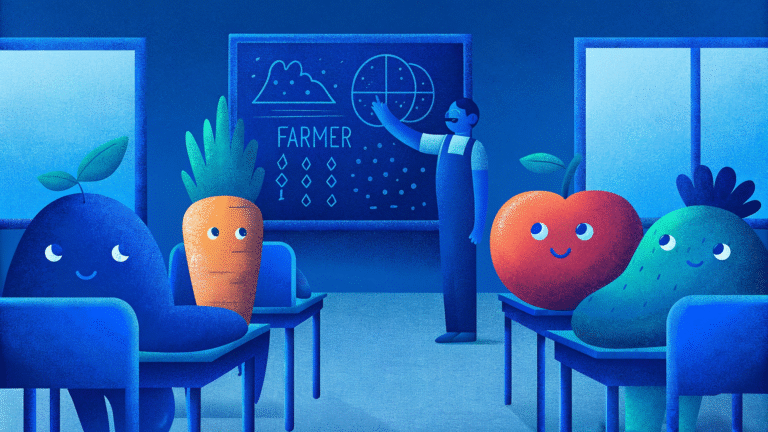Kalam Labs: Where STEM Meets Fun and Learning Takes Flight

Kalam Labs is an innovative startup that combines education with interactive gaming to make learning engaging for children. Founded in 2021 by Ahmad Faraaz, Harshit Awasthi, and Sashakt Tripathi, the company aims to revolutionize the educational landscape by integrating live game streaming with K-12 learning.
The founders, alumni of BITS Pilani, share a passion for space and technology. They envisioned a platform where education intersects with gaming, making learning more appealing to children. This vision led to the creation of Kalam Labs, which offers live multiplayer gaming sessions where children can attend virtual science lessons on topics like space and dinosaurs. Instructors play mission-based games live, allowing kids to interact with them and each other through video and chat.
Kalam Labs is headquartered in Kota, Rajasthan, India. The platform focuses on making science education engaging through interactive virtual missions and live game-based learning sessions. The app, available on Android and iOS, has over 10,000 downloads on the PlayStore and offers live streams of various space missions.
The startup has garnered attention for its unique approach to education, earning international recognition for innovation. By leveraging the immersive nature of gaming, Kalam Labs creates an environment where learning becomes an adventure, inspiring curiosity and a love for science among young learners.
Mission Possible: The Trio Behind Kalam Labs’ Launch
Kalam Labs was founded in 2021 by Ahmad Faraaz, Harshit Awasthi, and Sashakt Tripathi, all alumni of BITS Pilani. Their shared passion for space and technology inspired them to create an innovative platform that combines education with interactive gaming. Prior to establishing Kalam Labs, the founders founded Elixar Systems, a company they founded in 2018, which focused on developing artificial intelligence solutions.
The idea for Kalam Labs emerged during the COVID-19 lockdowns when traditional education methods faced significant challenges. Recognizing the need for engaging and accessible learning solutions, the trio envisioned a platform where education and gaming intersect to make learning more appealing to children. They started with live multiplayer gaming sessions, allowing children to attend virtual science lessons on topics like space and dinosaurs.
Ahmad Faraaz
Ahmad Faraaz graduated from the Birla Institute of Technology and Science, Pilani (BITS Pilani), where he pursued an MSc in Mathematics and a B.E. in Computer Science. His entrepreneurial drive led him to attend a summer program in entrepreneurship at the National University of Singapore. Ahmad had already gained recognition for his work on innovative educational tools, such as the E-Pathshala AR app in collaboration with NCERT, before co-founding Kalam Labs in January 2021. (Ahmad Faraaz)
Sashakt Tripathi
Sashakt Tripathi, also an alumnus of BITS Pilani, earned his Bachelor’s degree in Computer Science. His journey as an innovator began during his college years, where he co-founded Elixar Systems, a venture focused on augmented reality-powered education. Under his leadership, Elixar Systems developed AR-based science labs, enabling children to conduct experiments from their homes during the pandemic. Before launching Kalam Labs, Sashakt worked on projects that integrated artificial intelligence with networking solutions. (Sashakt Tripathi)
Harshit Awasthi
Harshit Awasthi brought to the team his scientific curiosity and research background. A fellow graduate of BITS Pilani, Harshit had gained significant experience through internships at prestigious research institutions like CSIR-CEERI. Like his co-founders, Harshit’s work has been recognized globally, earning him a place on Forbes’ 30 Under 30 Asia list alongside Ahmad and Sashakt. (Harshit Awasthi)
Classroom of the Future: EdTech’s Infinite Expansion
The education technology (EdTech) industry has experienced significant growth in recent years, transforming traditional educational methods through digital innovations. In 2023, the global EdTech market was valued at approximately USD 142.37 billion and is projected to expand at a compound annual growth rate (CAGR) of 13.4% from 2024 to 2030, reaching an estimated USD 344.72 billion by 2030. (Grand View Research)
This growth is driven by the increasing adoption of digital learning solutions, the integration of advanced technologies such as artificial intelligence (AI) and virtual reality (VR), and the rising demand for accessible and flexible education platforms. The COVID-19 pandemic further accelerated the shift towards online education, highlighting the importance of robust EdTech solutions in ensuring continuity of learning.
Regionally, North America has maintained a dominant position in the EdTech market, accounting for over 37.3% of the global revenue, with a market size of USD 82.24 billion in 2023. This dominance is attributed to advanced technological infrastructure and a strong focus on educational enhancement through technology. (Market.us)
The EdTech industry encompasses a wide range of applications, including online courses, virtual classrooms, educational software, and interactive learning tools. The integration of AI and VR technologies has facilitated personalized learning experiences, adaptive assessments, and immersive educational environments, enhancing student engagement and learning outcomes.
Despite the rapid growth, challenges such as ensuring quality and effectiveness of EdTech solutions, high costs of infrastructure, and lack of technical skills among educators persist. Addressing these challenges through strategic partnerships, scalable solutions, and targeted training programs is essential for the sustained expansion of the EdTech market.
Building Dreams: Kalam Labs’ Mission, Vision, and Model
The company aims to revolutionize the educational landscape by integrating live game streaming with K-12 learning. The founders, alumni of BITS Pilani, share a passion for space and technology. They envisioned a platform where education intersects with gaming, making learning more appealing to children.
Kalam Labs addresses the challenge of making education captivating for children by integrating gaming elements with educational content. Their platform offers live multiplayer gaming sessions where children can participate in virtual science lessons on topics like space exploration and dinosaurs. This approach transforms traditional learning into an interactive experience, enhancing engagement and retention.
The company’s business model revolves around providing these interactive educational experiences through their platform, accessible via a subscription or purchase model. They offer various services, including internships, mentoring, volunteering, training, consulting, startup support, patenting, research, and funding, creating a comprehensive ecosystem for learning and development.
Tools of Tomorrow: Kits, Controllers, and Kid-Friendly Creations
Kalam Labs stands out as an edtech company merging gaming with education, focusing on creating engaging and interactive learning experiences for children. Their product lineup and solutions reflect a commitment to hands-on learning and technological innovation.
Tech Maker Program
Kalam Labs’ Tech Maker Program encourages young learners to build and experiment with cutting-edge educational tools. (Techmaker)
This program provides DIY kits, such as:
Quadcopter Kit
- Description: A DIY quadcopter kit enables students to assemble their drones and control them via smartphones.
- Technical Features:
- 15-minute flight time.
- 200-meter range.
- Supports advanced maneuvers using integrated sensors.
- Learning Goals:
- Teaches aerodynamics, wireless technology, and control systems.
Fixed Wing Plane Kit
- Description: A smartphone-controlled aircraft kit.
- Technical Features:
- 10-minute flight time.
- 100-meter range.
- Learning Goals:
- Explores principles of lift, drag, and propulsion.
Magnus Flying Plane
- Description: Created in collaboration with IIT Guwahati, this plane teaches the Magnus Effect, a fundamental concept in physics related to spinning objects.
- Learning Goals:
- Offers a hands-on approach to understanding Newtonian mechanics and fluid dynamics.
DIY Ornithopter
- Description: Inspired by bird flight, this kit allows students to build mechanical birds that can flap their wings.
- Learning Goals:
- Bridges biology and engineering principles.
- Special Collaboration: Developed with IIT Roorkee.
Programmable Telescope
- Description: A completely programmable telescope designed for backyard stargazing.
- Learning Goals:
- Encourages exploration of astronomy and programming.
- Special Collaboration: Created with IIT Kanpur.
Collaborative Inventions Kalam Labs collaborates with premier institutions like IIT Guwahati, IIT Roorkee, and BITS Pilani to design advanced educational products. Some notable innovations include:
- Magnus Flying Plane: Developed by IIT Guwahati, this device demonstrates the Magnus Effect, helping students explore Newtonian mechanics in flight.
- DIY Ornithopter: Created with IIT Roorkee, this kit teaches students to fabricate and fly mechanical birds, blending biology with engineering principles.
- Programmable Telescope: Designed by IIT Kanpur, this telescope is completely programmable, enabling students to explore astronomy directly from their backyards.
Microcontroller Technology Kalam Labs integrates custom-built microcontrollers into their products to enhance functionality. These microcontrollers include:
- KL Fixed Wing Microcontroller: Features an 80 MHz clock speed and three onboard sensors for streamlined mission execution.
- KL Quadcopter Microcontroller: Equipped with a 160 MHz clock speed and five sensors, including barometric and temperature pressure sensors. It supports high-compute missions and advanced drone operations.
Live Game-Based Learning Missions
In addition to physical kits, Kalam Labs excels in virtual learning. Their live game-based sessions involve multiplayer games where children learn about science topics such as space exploration and dinosaur biology. Instructors use mission-based gaming to create an immersive and collaborative educational environment.
Custom Missions
Kalam Labs has launched ambitious initiatives, including space-related missions where students engage in practical tasks like launching model rockets. These programs are designed to inspire curiosity and deepen students’ understanding of scientific principles.
Custom RC Planes
The Custom RC Plane designed by AeroMIT offers adjustable wings and a modular structure, allowing kids to experiment with flight dynamics and customization. This innovative product fosters creativity and problem-solving skills while teaching aerodynamics.
By integrating advanced technologies like sensors, programmable devices, and live gaming, Kalam Labs transforms education into a dynamic and enjoyable experience. Their innovative tools and programs empower young learners to explore complex STEM topics interactively, bridging the gap between traditional education and modern technology.
Brain Meets Game: The Tech That Powers Kalam Labs
Kalam Labs integrates advanced technology into its products and services to transform traditional education into a dynamic experience. One of the core technologies behind Kalam Labs is its custom-built microcontrollers, which power their educational kits like quadcopters, planes, and programmable telescopes. These microcontrollers are designed for high computational efficiency, supporting various sensors and advanced functionalities.
For example, the KL Quadcopter Microcontroller operates at 160 MHz and integrates five sensors, including barometric and temperature pressure sensors. This high-speed processing enables students to perform complex aerial maneuvers and missions. Similarly, the KL Fixed Wing Microcontroller, with an 80 MHz clock speed, offers lightweight, high-performance capabilities ideal for fixed-wing aircraft.
Kalam Labs also leverages live gaming technology to deliver its game-based learning sessions. Students participate in multiplayer gaming environments where they collaborate to complete science-based missions. Instructors guide these live sessions, interacting with students in real-time to explain concepts and answer questions. This approach blends gaming and education seamlessly, fostering engagement and improving retention of scientific principles. Topics range from space exploration to biology, providing a broad curriculum that caters to young learners’ curiosity.
The company’s innovation extends to its collaborations with leading institutions such as IITs and BITS. These partnerships have resulted in the development of advanced educational tools like the Programmable Telescope and DIY Ornithopter. These products incorporate programmable features and engineering principles, allowing students to gain hands-on experience in coding, fabrication, and problem-solving.
A standout feature of Kalam Labs’ approach is its focus on real-world applications. Their programs, such as the Rocket Launcher for Kids, teach students the principles of propulsion and aerodynamics through hands-on activities. These activities mimic real engineering challenges, helping students develop practical skills in STEM fields.
Kalam Labs integrates smartphone connectivity across many of its products, enabling remote control and data analysis. Their drones and aircraft, for instance, use smartphone apps for real-time navigation and control. This feature not only makes the devices more accessible but also introduces students to concepts like IoT (Internet of Things) and wireless communication.
The company also explores virtual reality (VR) and augmented reality (AR) technologies to enhance their offerings. These immersive tools provide students with a deeper understanding of scientific phenomena by simulating real-world scenarios, making abstract concepts more relatable and easier to grasp.
Through the integration of innovative hardware, software, and gaming technologies, Kalam Labs is redefining how children interact with STEM education. Their focus on practical learning, interactivity, and cutting-edge technology positions them as a leader in educational innovation.
Achievements Unlocked: Kalam Labs’ Market Scorecard
Since its inception in 2021, the platform has attracted a community of over 300,000 kids, each spending an average of 3 to 5 hours per week engaged in its immersive learning environment. (Forbes)
In 2022, Forbes recognized the company in its “30 Under 30 Asia – Consumer Technology” list, highlighting the founders’ efforts in building a STEM metaverse for children. Additionally, the startup received international recognition for innovation from the Finland Education Ministry. (Kalam Labs)
Kalam Labs has collaborated with prestigious institutions to develop specialized educational kits and programs. For instance, in partnership with the Indian Institutes of Technology (IITs), BITS Pilani and the Manipal Institute of Technology, they have created products like the Magnus Flying Plane, DIY Ornithopter, Rocket Launcher for Kids, Custom RC Plane, and Programmable Telescope.
Investments Take Flight: Funding Kalam Labs’ Big Ideas
The startup has successfully attracted investments from a diverse group of backers, including Y Combinator, Lightspeed India, Pioneer Fund, First Cheque, Force Ventures, and 2am VC. In August 2021, the company completed a seed funding round, raising $450,000 from prominent investors. (PitchBook)
This infusion of capital has been instrumental in advancing Kalam Labs’ technological infrastructure, expanding its product offerings, and scaling its operations to reach a broader audience. The company’s innovative approach has attracted a growing user base, with over 300,000 children engaging with its platform.
The company’s financial performance has shown a promising trajectory. In FY 2022-23, Kalam Labs generated revenue of ₹2.4 lakhs. This followed a strong performance in FY 2021-22, when the company reported ₹52.1 lakhs in revenue, demonstrating significant growth compared to earlier years. During FY 2020-21, revenue stood at ₹8.5 lakhs, and in FY 2019-20, the company earned ₹7.5 lakhs.
Full STE(A)M Ahead: Kalam Labs Inspires the Next Generation
Kalam Labs is transforming how children learn by combining education with innovative technology and interactive experiences. The startup specializes in creating tools and programs that make STEM topics fun, engaging, and hands-on. Their live game-based learning sessions and DIY kits, such as drones, rockets, and programmable telescopes, provide young learners with a dynamic way to explore complex concepts. By leveraging custom-built microcontrollers, real-time gaming technology, and collaborations with prestigious institutions like IITs and MIT, Kalam Labs bridges the gap between traditional education and the digital age.
The startup’s products are designed to inspire curiosity and creativity in children aged 6-14. Through multiplayer gaming missions, kids learn about topics like space exploration and biology while collaborating with peers and instructors in real-time. Their DIY kits allow students to build and operate functional tools, teaching them aerodynamics, engineering, and programming. Kalam Labs brings practical, hands-on learning to the forefront of education, helping children develop critical thinking and problem-solving skills.Their approach redefines education as an interactive adventure, engaging students in ways that traditional methods often cannot. Want more inspiring startup stories? Check out other articles on Venture Kites. Learn from the journeys of innovators transforming industries.
At a Glance with DORK Company

Dive In with Venture Kites
Lessons From Kalam Labs
Reimagine Traditional Models
The Lesson & Why it Matters: Challenging traditional norms allows for breakthrough innovation. New perspectives create opportunities for transformation.
Implementation: Evaluate outdated systems in your industry and find ways to improve or replace them.
How Kalam Labs Implements It: They reimagined STEM education by combining hands-on kits with gaming, creating an entirely new learning paradigm.
Prioritize Accessibility Without Compromising Quality
The Lesson & Why it Matters: Accessible solutions have broader reach and impact, but they should also maintain high standards of quality.
Implementation: Streamline production costs without sacrificing performance or user experience.
How Kalam Labs Implements It: Their affordable DIY kits ensure widespread accessibility while providing excellent educational value.
Leverage Trends in Emerging Technologies
The Lesson & Why it Matters: Staying ahead of technological trends positions you as a forward-thinking leader in your industry.
Implementation: Invest in learning and applying cutting-edge technologies in your solutions.
How Kalam Labs Implements It: They use technologies like IoT, AR, and custom microcontrollers to deliver futuristic learning experiences.
Build a Community Around Your Product
The Lesson & Why it Matters: Communities create brand loyalty and amplify user engagement. They also provide a space for collaborative learning.
Implementation: Foster connections among your users through events, forums, or shared experiences.
How Kalam Labs Implements It: Their live multiplayer gaming sessions allow students to learn collaboratively, building a vibrant, engaged community.
Balance Innovation with Simplicity
The Lesson & Why it Matters: Cutting-edge solutions should remain accessible and easy to use. Complexity can deter potential users.
Implementation: Focus on intuitive design and user-friendly interfaces while delivering powerful features.
How Kalam Labs Implements It: Their products, from smartphone-controlled drones to interactive gaming, prioritize simplicity alongside advanced technology.
Youtube Shorts
Author Details
Creative Head – Mrs. Shemi K Kandoth
Content By Dork Company
Art & Designs By Dork Company












